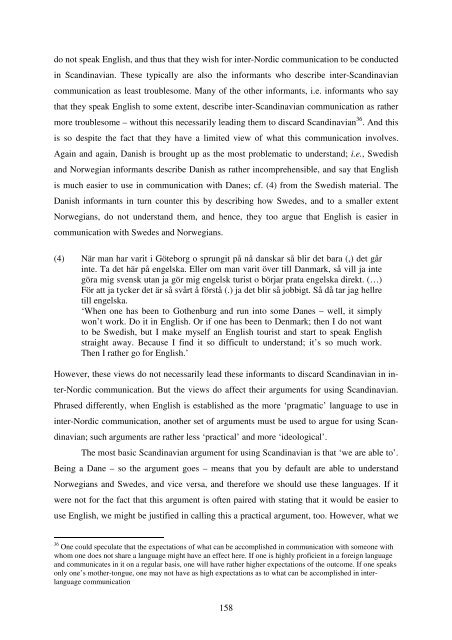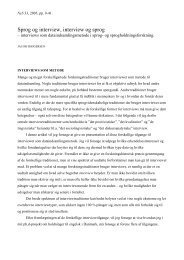Hør dog hvad de siger - Note-to-Self: Trials & Errors
Hør dog hvad de siger - Note-to-Self: Trials & Errors
Hør dog hvad de siger - Note-to-Self: Trials & Errors
You also want an ePaper? Increase the reach of your titles
YUMPU automatically turns print PDFs into web optimized ePapers that Google loves.
do not speak English, and thus that they wish for inter-Nordic communication <strong>to</strong> be conducted<br />
in Scandinavian. These typically are also the informants who <strong>de</strong>scribe inter-Scandinavian<br />
communication as least troublesome. Many of the other informants, i.e. informants who say<br />
that they speak English <strong>to</strong> some extent, <strong>de</strong>scribe inter-Scandinavian communication as rather<br />
more troublesome – without this necessarily leading them <strong>to</strong> discard Scandinavian 36 . And this<br />
is so <strong>de</strong>spite the fact that they have a limited view of what this communication involves.<br />
Again and again, Danish is brought up as the most problematic <strong>to</strong> un<strong>de</strong>rstand; i.e., Swedish<br />
and Norwegian informants <strong>de</strong>scribe Danish as rather incomprehensible, and say that English<br />
is much easier <strong>to</strong> use in communication with Danes; cf. (4) from the Swedish material. The<br />
Danish informants in turn counter this by <strong>de</strong>scribing how Swe<strong>de</strong>s, and <strong>to</strong> a smaller extent<br />
Norwegians, do not un<strong>de</strong>rstand them, and hence, they <strong>to</strong>o argue that English is easier in<br />
communication with Swe<strong>de</strong>s and Norwegians.<br />
(4) När man har varit i Göteborg o sprungit på nå danskar så blir <strong>de</strong>t bara (,) <strong>de</strong>t går<br />
inte. Ta <strong>de</strong>t här på engelska. Eller om man varit över till Danmark, så vill ja inte<br />
göra mig svensk utan ja gör mig engelsk turist o börjar prata engelska direkt. (…)<br />
För att ja tycker <strong>de</strong>t är så svårt å förstå (.) ja <strong>de</strong>t blir så jobbigt. Så då tar jag hellre<br />
till engelska.<br />
‘When one has been <strong>to</strong> Gothenburg and run in<strong>to</strong> some Danes – well, it simply<br />
won’t work. Do it in English. Or if one has been <strong>to</strong> Denmark; then I do not want<br />
<strong>to</strong> be Swedish, but I make myself an English <strong>to</strong>urist and start <strong>to</strong> speak English<br />
straight away. Because I find it so difficult <strong>to</strong> un<strong>de</strong>rstand; it’s so much work.<br />
Then I rather go for English.’<br />
However, these views do not necessarily lead these informants <strong>to</strong> discard Scandinavian in in-<br />
ter-Nordic communication. But the views do affect their arguments for using Scandinavian.<br />
Phrased differently, when English is established as the more ‘pragmatic’ language <strong>to</strong> use in<br />
inter-Nordic communication, another set of arguments must be used <strong>to</strong> argue for using Scan-<br />
dinavian; such arguments are rather less ‘practical’ and more ‘i<strong>de</strong>ological’.<br />
The most basic Scandinavian argument for using Scandinavian is that ‘we are able <strong>to</strong>’.<br />
Being a Dane – so the argument goes – means that you by <strong>de</strong>fault are able <strong>to</strong> un<strong>de</strong>rstand<br />
Norwegians and Swe<strong>de</strong>s, and vice versa, and therefore we should use these languages. If it<br />
were not for the fact that this argument is often paired with stating that it would be easier <strong>to</strong><br />
use English, we might be justified in calling this a practical argument, <strong>to</strong>o. However, what we<br />
36 One could speculate that the expectations of what can be accomplished in communication with someone with<br />
whom one does not share a language might have an effect here. If one is highly proficient in a foreign language<br />
and communicates in it on a regular basis, one will have rather higher expectations of the outcome. If one speaks<br />
only one’s mother-<strong>to</strong>ngue, one may not have as high expectations as <strong>to</strong> what can be accomplished in interlanguage<br />
communication<br />
158



